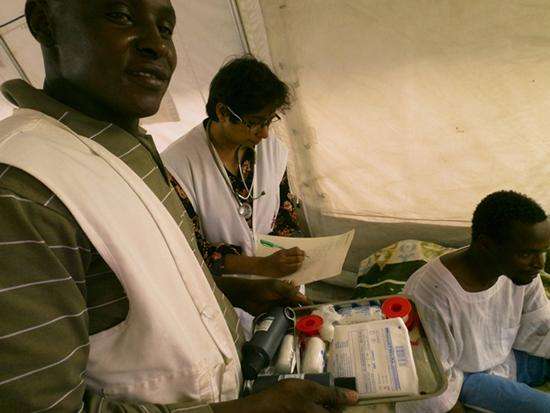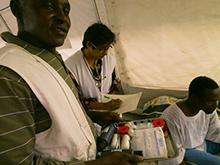Before Doctors Without Borders/Médecins Sans Frontières (MSF) arrived in early April, Tissi had no functioning hospital. MSF now runs a health center in Tissi, a health post in Um Dukkum, and mobile clinic services in Gadar and Ab Gadam. To date, medical teams have consulted 4,700 patients—including refugees, returnees, and local people—at all three locations, and more than 200 children have been treated for malnutrition at inpatient and outpatient feeding centers. Twenty-four percent of all admissions have been violence-related.
“We remain concerned about those who are unable to reach the camps in Chad and are either exposed to ongoing violence or have no access to humanitarian assistance,” says Tom Roth, MSF operation manager in Chad.
Patient Story: Sadam*, 33-year-old herder, Sudanese refugee
“I was in the center of my town, Abugaradil, when I saw vehicles entering. I was minding my own business, not taking part in any fighting, but I was hit by a stray bullet which entered my right arm. Many villagers were killed. My brothers put me in a cart and carried me one-and-a-half hours across the border to the hospital in Tissi. We had no problems crossing the border and they brought me here because there is security and the people here speak the same language as me. I have a wife and a baby son who are now living with other refugees outside Tissi. They only came with the clothes on their back, but she comes and brings me food every day. I am very happy. There were others injured in the attack and MSF sent the most seriously wounded by plane to nearby Abeche for surgery. No one else would have done this. I am very thankful to MSF.”
MSF is also concerned about deteriorating conditions for more than 22,000 Chadians who had previously fled to Darfur to escape violence in Chad and who qualify for only limited aid. The returnees and refugees are mostly female-headed households with large numbers of youths and children under the age of five, who are particularly vulnerable.
MSF has increased non-food item (NFI) distribution, with a recent distribution of 2,500 NFI kits to returnees in different locations, and is directly supporting the Ab Gadam refugee camp by building 200 latrines and providing water trucking service. The situation in the camp remains critical with 10 liters [about 2.5 gallons] of water distributed daily to each person, which is only half the recommended minimum amount universally recognized to cover basic needs.
Patient Story: Hassan*, 40-year-old herder, Sudanese refugee
“I was in Abugaradil when I saw vehicles carrying heavily armed men come through town. There were about 25 vehicles and those in the trucks started firing on people in the street. I joined the fighting with a machete and was trying to defend my family. I was shot in the right thigh and fellow villagers dragged me away. I was brought to hospital in Tissi in a cart, and I know this area because I used to come here every week on market day. I have a wife and eight children who came here with nothing and they are living under a tree with some jerry cans to collect water. My wife brings me a meal to eat every day and other refugees who know I am in hospital also give me food. MSF has helped me to get better and for that I am very grateful.”
“As the rainy season begins, we are concerned that insufficient access to clean water, hygiene facilities, and latrines could lead to an outbreak of diseases, such as cholera,” says Jason Mills, MSF head of mission in Chad. “We are also seeing increasing levels of malnutrition and fear that the limited food assistance to returnees could exacerbate the situation.”
In response to the relocation of refugees from Tissi to Ab Gadam, 30 kilometers [about 18.5 miles] away, MSF has split its team up to react to the urgent needs of the camp and will remain in the area to provide emergency response until the end of the rainy season in November.
*Patient names changed.





